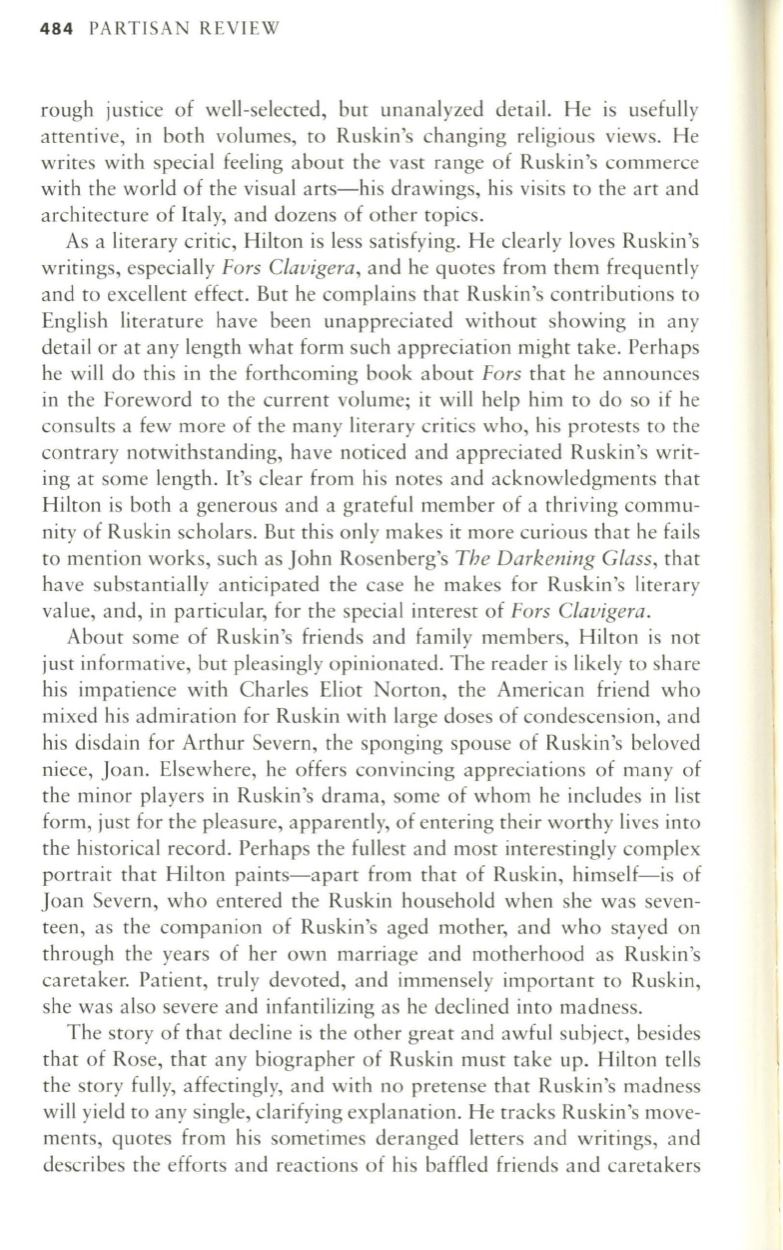
484
PARTISAN REVIEW
rough justice of well-selected, but unanalyzed detail. He is usefully
attentive, in both volumes, to Ruskin's changing religious views. He
writes with special feeling about the vast range of Ruskin 's commerce
with the world of the visual arts-his drawings, his visits to the art and
architecture of Italy, and dozens of other topics.
As a literary critic, Hilton is less satisfying. He clearly loves Ruskin's
writings, especially
Fars Clavigera,
and he quotes from them frequently
and to excellent effect. But he complains that Ruskin's contributions to
English literature have been unappreciated without showing in any
detail or at any length what form such appreciation might take. Perhaps
he will do this in the forthcoming book about
Fars
that he announces
in the Foreword to the current volume; it will help him to do so if he
consults a few more of the many literary critics who, his protests to the
contrary notwithstanding, have noticed and appreciated Ruskin's writ–
ing at some length. It's clear from his notes and acknowledgments that
Hilton is both a generous and a gratefu l member of a thriving commu–
nity of Ruskin scholars. But this only makes it more curious that he fails
to mention works, such as John Rosenberg's
The Darkening Glass,
that
have substantially anticipated the case he makes for Ruskin's literary
value, and, in particular, for the special interest of
Fars Clavigera.
About some of Ruskin's friends and family members, Hilton is not
just informative, but pleasingly opinionated. The reader is likely to share
his impatience with Charles Eliot Norron, the American friend who
mixed his admiration for Ruskin with large doses of condescension, and
his disdain for Arthur Severn, the sponging spouse of Ruskin's beloved
niece, Joan. Elsewhere, he offers convincing appreciations of many of
the minor players in Ruskin's drama, some of whom he includes in list
form, just for the pleasure, apparently, of entering their worthy lives into
the historical record. Perhaps the fullest and most interestingly complex
portrait that Hilton paints-apart from that of Ruskin, himself-is of
Joan Severn, who entered the Ruskin household when she was seven–
teen, as the companion of Ruskin's aged mother, and who stayed on
through the years of her own marriage and motherhood as Ruskin's
caretaker. Patient, truly devoted, and immensely important to Ruskin,
she was also severe and infantilizing as he declined into madness.
The story of that decline is the other great and awful subject, besides
that of Rose, that any biographer of Ruskin must take up. Hilton tells
the story fully, affectingly, and with no pretense that Ruskin's madness
will yield to any single, clarifying explanation. He tracks Ruskin's move–
ments, quotes from his sometimes deranged letters and writings, and
describes the efforts and reactions of his baffled friends and caretakers


